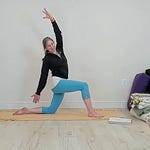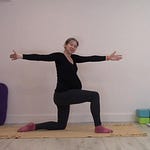Don’t have time to read? Listen to this week’s post instead.
Hello yoginis,
It’s Mother’s Day here in the US, a day for celebrating the mostly unseen work mothers do to keep the human race flourishing.
When responding to
’s Unspoken Words series, I realized I never gave much conscious thought to becoming a mother. How do you define mother, anyway? Mother is more than the person who ensures the existence of the human race, but also, how can there be anything more powerful, special, and amazing?In the yoga tradition the Mother Goddess is the universe. Maya Tiwari shares in her book The Path of Practice, “In the beginning, there was absolute stillness. Nothing existed—neither time nor space, gods nor goddesses. Not food, breath, or sound; only the dimensionless force of consciousness was there…The creator Brahma hibernated in the lotus-womb of Mother Universe.”1 She is everywhere in everything manifested as shakti in each of us, a primordial energy that protects, nourishes, and heals, a powerful force that catalyzes the feminine cycle of creation, regeneration, and destruction. The Vedic goddesses and Tantric Mahavidyas are all singular aspects of our infinite nature—manifestations of feminine consciousness in tangible form.
But that’s not what I think of when I think of “mother.” I think of expectations, to-do lists, and responsibility as if mothering is a burden. In her book Yoni Shakti, Uma Dinsmore-Tuli equates women’s biological experiences to siddhis, powers2. This reframe of menstruation, childbirth, motherhood, perimenopause, and menopause as powers to be embraced rather than unfortunate realities to be managed, dismissed, ignored, or endured is refreshing. In this season of motherhood, my yoga practice has become about embracing these inherent powers within me.
Embracing matrescence
writes about the concept of matrescense —the idea that coming into motherhood is a physiological change as significant as going through puberty or menopause. It’s nice that the Western medical establishment is finally catching up with Eastern spirituality. Anyone who has become a mother will affirm that the transformation is physical, mental, emotional, physiological, spiritual—and stressful. There is so much unknown in every aspect of your life from your daily routines to what is happening in your body.Before becoming a mother, the last time I felt a similar level of uncertainty, transformation, and stress was when I graduated from college. I no longer had the comfort of teachers to hold my hand, set my deadlines, or give me regular feedback on my performance. I was on my own, away from home, and I came to a rapid realization that the adult world is not orderly and rule-following as I naively assumed. I thought once you get into the “real” world, everyone has their shit together. Silly me. My school years provided a bubble that sheltered me from the terrifying chaos that is “adulting.” It was the rudest awakening.
As
mentioned in my latest Women + Wellbeing interview, it was the philosophy and ethics of yoga that inspired me most during this challenging transformation, not the poses. It was the mindset, devotion, faith, and principles that helped me become the adult I wanted to be. Similarly, in early motherhood, I didn’t have time for formal practices and my body wasn’t ready for poses. I relied on the principles of the Yoga Sutra to help me through the transition. I had to remind myself that asana is less about striving for perfect alignment and more about being steady and comfortable (Yoga Sutra 2.47). Steadiness is discovered through relaxation and rest, not effort. Comfort is experienced by expanding your awareness to encompass the infinite, not controlling every piece of your life (Yoga Sutra 2.48). Suffering can be relieved not by holding Downward Facing Dog for five breaths, performing Kapalabhati breathing for 11 minutes, or meditating for 30 minutes, two times a day at sunrise and before dinner, but by recognizing that you are not your thoughts, your body, or your circumstances.Everything, everywhere, all at once
I enjoy reading
’s Substack because she’s constantly considering this question: Am I a good mom/person/human? I've never thought that I was a bad mom, though there have certainly been moments when I've doubted myself. In those moments, the words reverberating in my head are, “What is wrong with me,” as if my entire Self is consumed by the identity of mom. On the safety of my meditation cushion, I’m all about dropping attachment to roles and identities. Out in the world I’m constantly worried about what the neighbors will think of my parenting choices. I’m confident in my abilities to show up and be a good mom for my kids, yet, in my most human moments when my nervous system is fried and I resort to yelling, I worry little Jimmy’s mom is going to think I’m a complete failure at “mother.” Somehow this equates to failure of Self.Mothers are everywhere and everything, which includes all your mistakes and failures alongside your joys and triumphs. It’s hard to be everywhere all at once and everything to everyone. The good news is it is your nature to be infinite love. Stop trying to be someone you’re not for a society that doesn’t value you for who you are: all-powerful and divine. You are always infinite nurturance. Most of the time, you’re also just a human with a fried nervous system.
In case practicing enlightened living is a bit of a stretch today, here’s a Mother’s Day yoga practice to help you re-calibrate your overstimulated mind. Maybe if you’re lucky you’ll drop in to experience a little sliver of your infinite existence.
Happy Mother’s Day (today and every day).
With gratitude,
Ashley
P.S. - Let me know how the class feels for you by commenting below after you finish.
Let’s chat in the comments
Share one practice (yoga-related or not) that has helped you move through transition. Let’s start a nice reference list of soothing practices for our lowest moments 😊.
Maya Tiwari, The Path of Practice: A Woman’s Book of Ayurvedic Healing (New York: Ballantine Books, 2000), 69.
Uma Dinsmore-Tuli, Yoni Shakti: A Woman’s Guide to Power and Freedom Through Yoga and Tantra (London: Yoga Words, 2020), 111-121.














Share this post